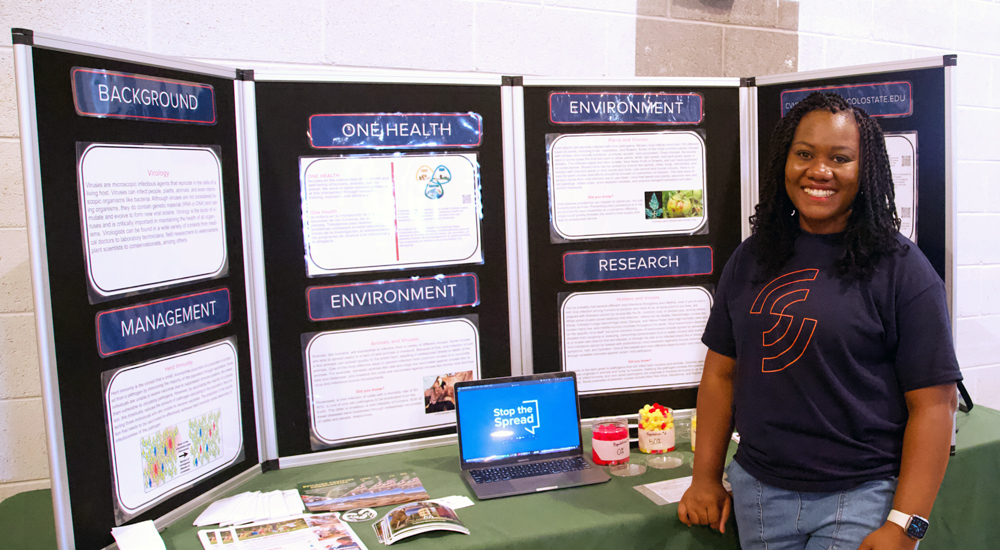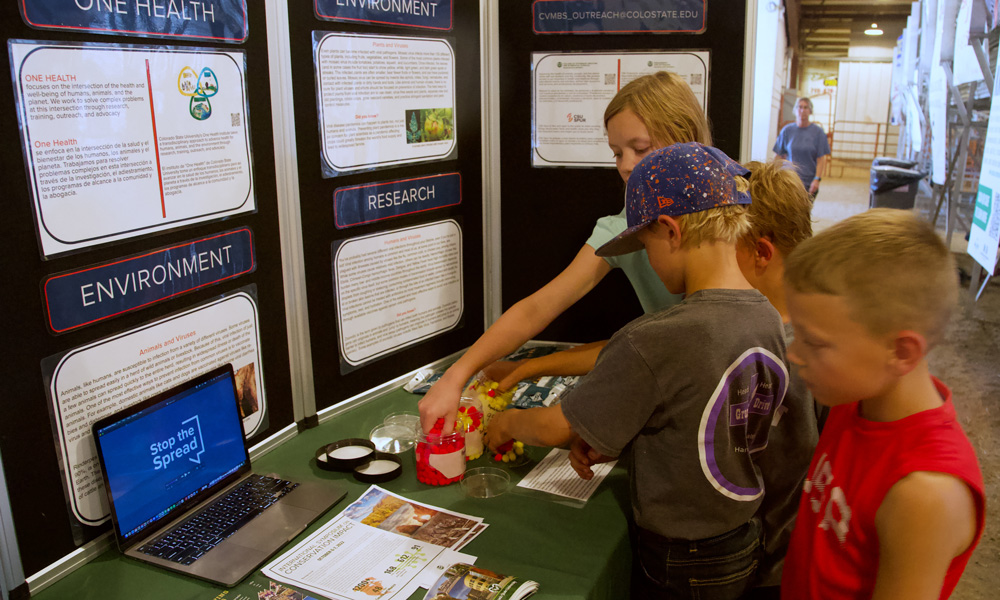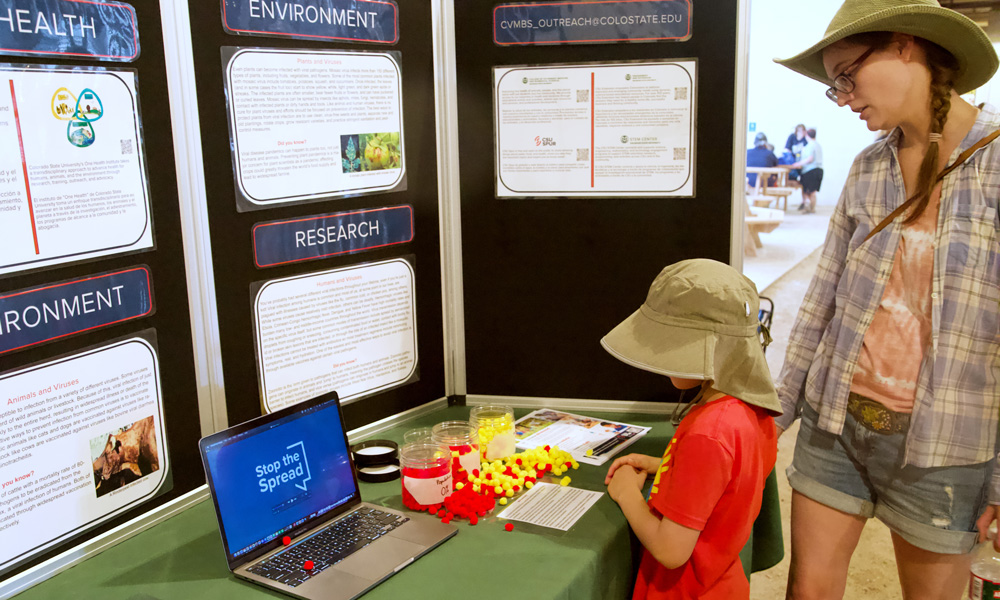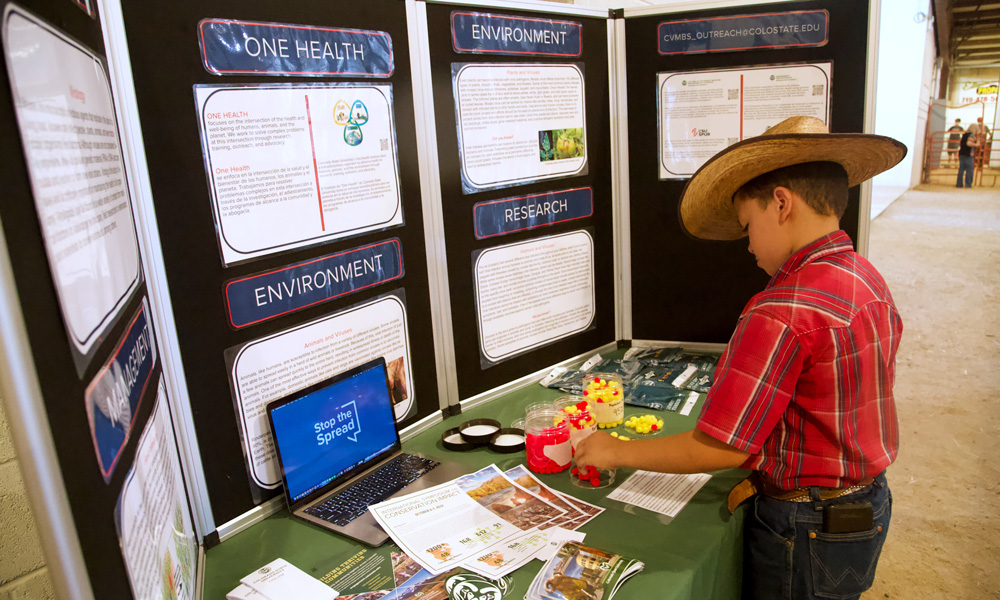Part of a special series highlighting College of Liberal Arts students and their summer internships with CSU Extension

By Samantha Martinez
The past few years of navigating the changing nature and recommendations for managing COVID-19 and its politicization has brought a new level of scrutiny and hesitation to routine vaccinations for many people. From changing COVID requirements and recommendations, to the science of virus spread, herd immunity, and efficacy of vaccines, the general public has navigated mountains of conflicting or misinformation. And that has caused many people to wonder about the safety and efficacy of vaccines in general.
JMC PhD candidate Joy Enyinnaya was already researching these trends and controversies surrounding COVID information and vaccine hesitancy as part of a larger misinformation grant project when the opportunity arose to participate in an Extension internship that could serve as a continuation of the grant’s research.
In the Spring of 2022, a research team including Enyinnaya, JMC Professor Ashley Anderson, professor and department chair Marilee Long, and several campus partners, conducted a series of focus groups consisting of public health professionals, community leaders, educators, business owners, and community stakeholders in Colorado to understand how they have been addressing misinformation and what kinds of misinformation they witnessed. Some significant findings emerged: The focus group found that some parents have grown hesitant about routine vaccination as a result of the volume of information, validity/reliability of the information, and misinformation surrounding COVID vaccination.
Enyinnaya’s internship in the rural and agriculture-heavy population of El Paso County was the perfect location to further understand these findings. The research team wanted to uncover what kinds of misinformation circulated around the community, chat with parents making vaccination decisions for their children, and discuss their experiences with COVID. For Enyinnaya, answering these research questions sparked her interest in the community aspect of the project where she could do more than conduct interviews, she could engage and teach members of the El Paso community about herd immunity and how viruses work.
Teaching and Learning: community engagement goes both ways
Using resources from CSU’s One Health, the Department of Microbiology, Immunology, and Pathology, and the research team, Enyinnaya and her Extension mentor, Jonathan Vrabec, set up a kid- and family-friendly booth at El Paso’s local county fair to share what herd immunity looks like, how viruses spread, and the importance of getting vaccinated for a community’s overall well-being.
To demonstrate herd immunity, Enyinnaya used labeled jars with different colored cotton balls to indicate virus and vaccination. “Herd immunity is when a community has a lot more people who are vaccinated and can protect those who are not able to be vaccinated from the virus,” says Enyinnaya. When the children pulled handfuls of cotton balls out of the jars, she would ask them about which community had better herd immunity. More red cotton balls in the jar indicated more virus spread and less herd immunity. After the children finished, Enyinnaya asked their parents if they were willing to be interviewed.



Enyinnaya employed several skills like teaching, communicating, and collaborating with mentors and partners to carry out this project. From fine-tuning research questions, to using the right language when asking about sensitive and controversial health topics, to setting the tone, “you wanted to make sure that folks that you were interviewing felt safe, comfortable to answer the question, did not feel interrogated, did not feel judged. And so the language we used mattered,” she says.
Enyinnaya received three kinds of perspectives from her interviews with parents: on one end of the spectrum, folks believe in the efficacy of COVID vaccines and received vaccinations for their kids and themselves; on the other end of the spectrum folks shared that government requirements and recommendations felt oppressive and refused to get COVID tested or wear masks. People in the middle of those two ends believe in the vaccines and their efficacy, but with emerging research and insufficient longitudinal studies, they need more time to see how children and adults respond to the COVID vaccine.
Several also said the COVID vaccine was making them more hesitant about other vaccines and the impact of “vaccine cocktails” that have multiple, varying vaccinations in one shot. Ultimately, Joy found that hesitancies stemming from COVID vaccines is changing attitude towards potentially receiving new vaccines in the future.
“That’s what I really appreciate about Extension is taking all this in-depth research and resources and taking it out to the community. That should be the whole point of what we’re doing because then folks are able to use it, apply it, and get results from it.” — Joy Enyinnaya
Reducing Misinformation: Taking research and resources into the community
In addition to the education material Enyinnaya and her team provided to the interviewed parents, they developed a video highlighting a few skills that empirical data has shown to correctly identify and stop the spread of misinformation:
- Look at the credibility of the person presenting the information and their sources.
- Confirm there is a connection between the expertise the person has and what they’re talking about.
- Question if the messaging is targeting emotions or evoking strong emotions like fear.
- Make sure the information is not driven by conspiracy theories which can be huge drivers of misinformation.
“That’s what I really appreciate about Extension is taking all this in-depth research and resources and taking it out to the community,” says Enyinnaya. “That should be the whole point of what we’re doing because then folks are able to use it, apply it, and get results from it. That was the most fulfilling part of it.”
Since Enyinnaya’s internship was a continuation of the larger misinformation project, the goal was to understand the population and what’s going on within communities, particularly with how misinformation is impacting vaccination decisions. The grant team’s plan is to use these materials to inform curriculum development at CSU and develop case studies with public health organizations like Immunize Colorado that tracks vaccination decision-making across the state. This data will play a significant role in developing a picture of what’s happening with vaccinations and vaccination hesitancy, particularly from a population-specific standpoint.
Internships: The Practical and Applied Side of the Liberal Arts
The CSU Summer Extension Internship program gives students the opportunity to take their research and expertise into the field to help communities across Colorado in the areas of Natural Resources and Sustainability, Food and Agriculture, Youth Development, Economic and Community Development, Health and Well-Being, and Emergency Planning and Resources.
In summer 2022, the College of Liberal Arts had 18 students participate in an Extension internship.